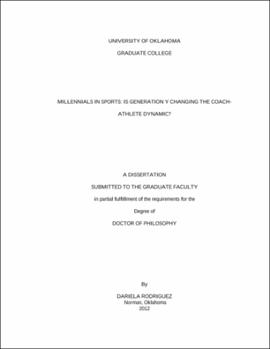| dc.description.abstract | The purpose of this research is to compare the Millennial generation, born between 1982 and 2002 (Howe & Strauss, 2003; Howe & Strauss, 2007, Huntley, 2006) to the generation immediately before them, Generation X, born between 1961 and 1981 (Howe & Strauss, 1993; Strauss & Howe, 1991), and seeks to find out if there are any differences between how coaches worked with Generation X and how they need to work with the Millennial generation. The current study was a qualitative look at members of two different tae kwon do dojangs as well as the instructors of each school. Interviews and observations were conducted to find out what similarities and/or differences existed between the coaching preference of Generation X and Millennial athletes using power, leadership styles, and communication accommodation theory as contexts. Interview questions were based on the factors used to build both the Leadership Scale for Sport (LSS) (Chelladuari & Saleh, 1980) which looks at five different leader behaviors of coaches: Training and instruction, democratic or autocratic behavior, social support of the coach, and positive feedback from the coach to the athlete the Multidimensional Model of Leadership (MML) which suggests that the performance outcome of a team is based on how congruent leader behavior is compared to athlete preferred leader behaviors (Chelladurai, 1980; Chelladurai, 1990; Chelladurai & Carron, 1983; Chelladurai & Riemer, 1998; Smith, Smoll, & Curtis, 1978). The analysis of the interaction between the Millennial athletes and their coaches in the study were used to find out if communication accommodation theory needs to be adapted when focusing on the millennial generation. | |
